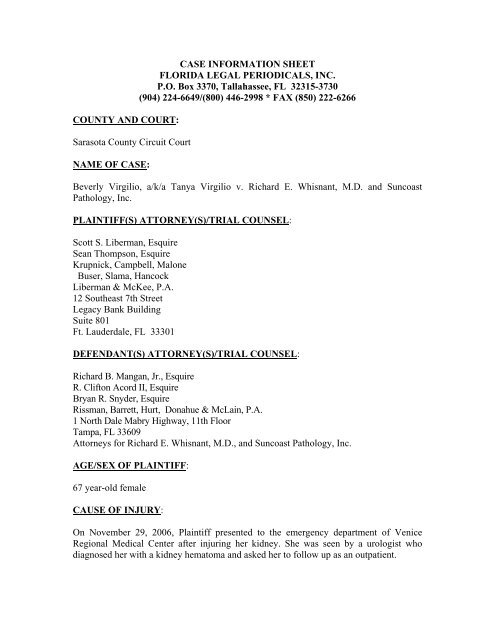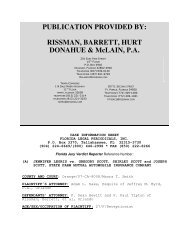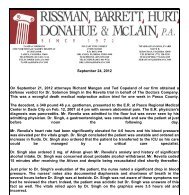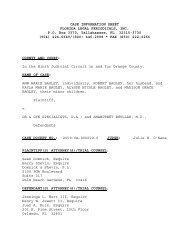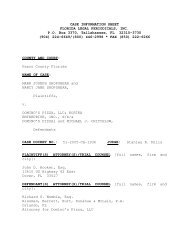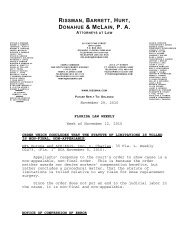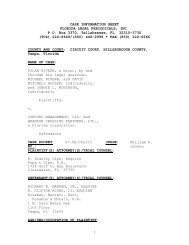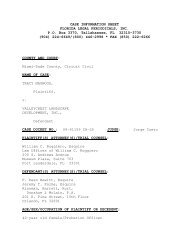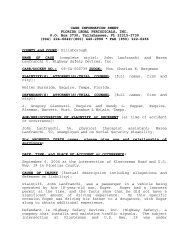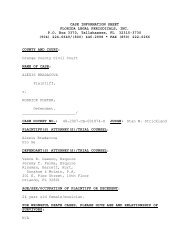Virgilio v. Richard Whisnant, M.D. - Rissman, Barrett, Hurt, Donahue ...
Virgilio v. Richard Whisnant, M.D. - Rissman, Barrett, Hurt, Donahue ...
Virgilio v. Richard Whisnant, M.D. - Rissman, Barrett, Hurt, Donahue ...
Create successful ePaper yourself
Turn your PDF publications into a flip-book with our unique Google optimized e-Paper software.
COUNTY AND COURT:<br />
Sarasota County Circuit Court<br />
NAME OF CASE:<br />
CASE INFORMATION SHEET<br />
FLORIDA LEGAL PERIODICALS, INC.<br />
P.O. Box 3370, Tallahassee, FL 32315-3730<br />
(904) 224-6649/(800) 446-2998 * FAX (850) 222-6266<br />
Beverly <strong>Virgilio</strong>, a/k/a Tanya <strong>Virgilio</strong> v. <strong>Richard</strong> E. <strong>Whisnant</strong>, M.D. and Suncoast<br />
Pathology, Inc.<br />
PLAINTIFF(S) ATTORNEY(S)/TRIAL COUNSEL:<br />
Scott S. Liberman, Esquire<br />
Sean Thompson, Esquire<br />
Krupnick, Campbell, Malone<br />
Buser, Slama, Hancock<br />
Liberman & McKee, P.A.<br />
12 Southeast 7th Street<br />
Legacy Bank Building<br />
Suite 801<br />
Ft. Lauderdale, FL 33301<br />
DEFENDANT(S) ATTORNEY(S)/TRIAL COUNSEL:<br />
<strong>Richard</strong> B. Mangan, Jr., Esquire<br />
R. Clifton Acord II, Esquire<br />
Bryan R. Snyder, Esquire<br />
<strong>Rissman</strong>, <strong>Barrett</strong>, <strong>Hurt</strong>, <strong>Donahue</strong> & McLain, P.A.<br />
1 North Dale Mabry Highway, 11th Floor<br />
Tampa, FL 33609<br />
Attorneys for <strong>Richard</strong> E. <strong>Whisnant</strong>, M.D., and Suncoast Pathology, Inc.<br />
AGE/SEX OF PLAINTIFF:<br />
67 year-old female<br />
CAUSE OF INJURY:<br />
On November 29, 2006, Plaintiff presented to the emergency department of Venice<br />
Regional Medical Center after injuring her kidney. She was seen by a urologist who<br />
diagnosed her with a kidney hematoma and asked her to follow up as an outpatient.
At the time of the outpatient follow-up visit, plaintiff’s urologist ordered a CT of the<br />
abdomen and pelvis and a CT urogram. The CT scans were performed on January 15,<br />
2007. The interpreting radiologist observed what he described as an ulcerated gastric<br />
mass highly suspicious for malignancy. The radiologist recommended a referral to a<br />
gastroenterologist for endoscopy and biopsy.<br />
On January 17, 2007, Plaintiff was seen by Ronald DeMasi, M.D., a gastroenterologist,<br />
for complaints of abdominal pain and left upper quadrant pain which had been present for<br />
quite some time. The gastroenterologist was made aware of the January 15, 2007 CT<br />
scan findings. The gastroenterologist recommended proceeding with upper endoscopy<br />
and arrangements were made to have the plaintiff added to his schedule that afternoon at<br />
Gulf Coast Endoscopy Center of Venice (GCEC).<br />
At the time of endoscopy Dr. DeMasi observed a large gastric ulcer/mass. Tissue biopsies<br />
of the gastric antrum and the gastric mass were performed. The tissue samples from these<br />
biopsies were sent to Defendant, Suncoast Pathology, Inc., for processing and<br />
interpretation by a pathologist.<br />
William Roth, M.D. reviewed the January 17, 2007 biopsies. He did not see any<br />
malignant cells. He diagnosed the antral biopsy as showing gastric mucosa with mild<br />
chronic inflammation. He diagnosed the gastric body mass as showing gastric mucosa<br />
with mild chronic inflammation and fragments of acute inflammatory exudate suggestive<br />
of ulcer. Dr. Roth was unable to exclude a submucosal tumor from the material on the<br />
gastric body mass.<br />
On January 19, 2007, Plaintiff presented to GCEC for two additional GI procedures<br />
which included an endoscopic ultrasound with fine needle aspiration biopsies (EUS-<br />
FNA) as well as additional tissue biopsies at the margin of the ulcer. The tissue biopsies<br />
were interpreted by Tamara Densmore, M.D. of Suncoast Pathology as being worrisome<br />
for neoplasm. Dr. Densmore did not make a definitive diagnosis of malignancy but did<br />
recommend correlation with clinical and endoscopic findings.<br />
The FNA required the assistance of a cytotechnologist employed by Suncoast Pathology<br />
who participated in the specimen collection and preparation process. The case initially<br />
consisted of eleven (11) aspirate smears and one (1) hemotoxylin and eosin (H & E)<br />
stained slide cut from a paraffin block. Subsequently eleven (11) additional slides were<br />
prepared at the request of Defendant <strong>Richard</strong> <strong>Whisnant</strong>, M.D., a cytopathologist with<br />
Suncoast Pathology, for the purpose of performing immunohistochemical staining.<br />
These 11 aspirate smears were created by directly smearing the specimen from the needle<br />
used to perform the FNA onto a glass slide. The material remaining in the syringe after<br />
the smear was prepared was rinsed/injected into a Coplin Jar and subsequently taken back<br />
to Suncoast Pathology to be centrifuged and embedded in paraffin.<br />
Dr. <strong>Whisnant</strong> interpreted the FNA case as showing the presence of malignant cells. In<br />
his report, he concluded that both the aspirate smears and the cell block demonstrated<br />
2
malignant epithelial cells. The immunohistochemical stains that were ordered<br />
supported the impression of carcinoma but the staining pattern and appearance failed to<br />
support a primary gastric carcinoma. Dr. <strong>Whisnant</strong> sent the case in consultation to Dr.<br />
Martha Pittman at Massachusetts General Hospital.<br />
On February 2, 2007, Dr. Pittman reported that the FNA case was positive for malignant<br />
cells. Her diagnosis was poorly differentiated carcinoma. She favored a gastric primary,<br />
although metastasis from elsewhere could not be completely excluded. Her report made<br />
it unclear if she had reviewed both the smears and the cell block slide.<br />
After receiving the diagnosis of gastric cancer, Plaintiff and her family decided to have<br />
her evaluated at Memorial Sloan-Kettering Cancer Center in New York, New York<br />
by Vivian Strong, M.D., a surgeon specializing in gastric cancers. Dr. Strong had the<br />
FNA case interpreted by Dr. <strong>Whisnant</strong> re-reviewed by a cytopathologist at Sloan, who<br />
agreed that malignant cells were present. Again, there was no specific indication as to<br />
whether the Memorial Sloan-Kettering Cancer Center pathologist had reviewed both the<br />
aspirate smears and the cell block slide.<br />
Plaintiff ultimately opted to undergo laparoscopic gastric resection. This was performed<br />
by Dr. Strong on March 12, 2007. The procedure performed was a laparoscopic subtotal<br />
gastrectomy with Roux-en-Y anastomosis and modified D2 lymphadenectomy.<br />
The entire removed portion of the plaintiff’s stomach was sectioned and microscopically<br />
examined. No evidence of malignancy was identified. Nearly 100 slides were made and<br />
no cancer was found. Plaintiff was discharged from Memorial Sloan-Kettering on March<br />
15, 2007 with plans to follow-up with Dr. Strong in her office on April 3, 2007.<br />
At the time of the April 3, 2007 follow-up visit with Dr. Strong, Plaintiff and her family<br />
were advised that the final pathology report revealed no residual cancer. This finding had<br />
been reviewed in detail with Dr. David Klimstra, a GI pathologist at Memorial Sloan-<br />
Kettering. According to Dr. Strong’s record, the patient and her family were informed<br />
that she very likely had a very early gastric cancer that was taken as a sample from the<br />
ulcer. However, in order to rule out a slide mix up, Plaintiff requested to have DNA<br />
testing performed.<br />
Molecular analysis was subsequently performed by Redpath Integrated Pathology in<br />
order to determine the genetic relatedness between Ms. <strong>Virgilio</strong>’s gastric biopsy/FNA and<br />
her gastric resection specimens. Sydney Finkelstein, M.D. interpreted the DNA data<br />
comparing the FNA specimen collected on January 19, 2007 interpreted by Dr. <strong>Whisnant</strong>,<br />
and representative tissue sections of Ms. <strong>Virgilio</strong>’s stomach from her subtotal<br />
gastrectomy. Dr. Finkelstein concluded that the cell block slide contained tissue<br />
fragments from two different patients. He concluded that the benign tissue fragments in<br />
the cell block specimen matched Ms. <strong>Virgilio</strong>’s subtotal gastrectomy specimen and the<br />
malignant cells in the specimen were from another female patient.<br />
3
After receiving the results of the Redpath DNA testing, the pathologists and treating<br />
doctors at Memorial Sloan-Kettering amended their final official reports to reflect that<br />
the actual diagnosis was a benign gastric ulcer rather than gastric cancer, concluding that<br />
Ms. <strong>Virgilio</strong> never had cancer. The DNA test results and amended reports were provided<br />
to Dr. <strong>Whisnant</strong> who, in turn, sent them to the plaintiff’s treating doctors in Florida. Dr.<br />
<strong>Whisnant</strong> did not contact the patient or amend his initial diagnosis.<br />
NATURE OF INJURY:<br />
Plaintiff alleged that her FNA specimen became cross-contaminated with cancer cells<br />
from another female patient most likely due to the failure of a histotech employed by<br />
Suncoast Pathology to wipe down their forceps at the time of embedding. She further<br />
alleged that this caused her to undergo an unnecessary subtotal laparoscopic gastrectomy.<br />
She alleged that the correct diagnosis was a benign gastric ulcer that could have been<br />
treated with medical management rather than surgical resection.<br />
PLAINTIFF'S EXPERT WITNESSES:<br />
Sydney Finkelstein, M.D.<br />
816 Middle Street<br />
Pittsburgh, PA 15212<br />
Dr. Finkelstein testified as an expert in solid tissue molecular pathology. He founded<br />
RedPath after spending 20 years as a practicing academic surgical pathologist. His most<br />
recent academic appointment prior to founding RedPath was a full professor at the<br />
University of Pittsburgh, where he also served as the Director of the Division of<br />
Molecular and Anatomic Pathology.<br />
Dr. Finkelstein did not charge Plaintiff’s counsel for his preparation time or trial<br />
testimony and only asked to be reimbursed for his air travel and lodging because he felt<br />
so strongly that Ms. <strong>Virgilio</strong>’s findings demonstrated contamination.<br />
Dr. Finkelstein testified that based upon his interpretation of Ms. <strong>Virgilio</strong>’s DNA data,<br />
there was a genetic mismatch which, more likely than not, meant that the FNA specimen<br />
was contaminated with cancer cells from another female patient.<br />
William Frable, M.D.<br />
Professor of Pathology<br />
Department of Pathology<br />
Virginia Commonwealth University<br />
The Gateway Building<br />
Room 6205<br />
200 East Marshall Street<br />
Richmond, VA 23219<br />
4
Dr. Frable is a board-certified cytopathologist. He testified that Dr. <strong>Whisnant</strong> misread the<br />
aspirate smears as showing evidence of malignancy. He did not feel any cancer cells<br />
were present on the smears. However, the slides prepared from the cell block processed at<br />
Suncoast Pathology showed malignant cells. This inconsistency should have alerted Dr.<br />
<strong>Whisnant</strong> to a possible contamination.<br />
Dr. Frable also testified that Suncoast Pathology and ultimately, Dr. <strong>Whisnant</strong>, had<br />
insufficient policies and procedures for the tracking of cell blocks and that, in his opinion,<br />
the cross-contaminant was introduced into the cell block as a result of one of the<br />
Suncoast Pathology employees failing to wipe their forceps at the embedding station in<br />
between cases.<br />
Lukejohn Day, M.D.<br />
Assistant Clinical Professor of Medicine<br />
Division of Gastroenterology<br />
San Francisco General Hospital<br />
1001 Protero Avenue<br />
Unit 3D-5<br />
San Francisco, CA 94110<br />
Dr. Day is a board-certified gastroenterologist. He served as a causation expert. In his<br />
opinion, Ms. <strong>Virgilio</strong> had an unnecessary subtotal gastrectomy presuming the results of<br />
the DNA testing performed at RedPath were accurate. He opined the gastric ulcer could<br />
have been treated by conservative medical management alone.<br />
DEFENDANT'S EXPERT WITNESSES:<br />
Rajesh Dash, M.D.<br />
Department of Pathology<br />
Division of Pathology Clinical Services<br />
Duke University Medical Center<br />
Box 3712<br />
Durham, NC 27710<br />
Dr. Dash is a fellowship-trained and board-certified cytopathologist. He reviewed the<br />
aspirate smears, as well as the slides created from the cell block and concluded that both<br />
the aspirate smear slides, as well as the cell block slides, demonstrated malignant cells. It<br />
was his opinion that Dr. <strong>Whisnant</strong>’s interpretation complied with the standard of care.<br />
Jennifer Hunt, M.D.<br />
Chairmen of the Department of<br />
Pathology and Laboratory Services<br />
College of Medicine<br />
University of Arkansas for Medical<br />
Sciences<br />
5
Dr. Hunt is a molecular genetic pathologist. She and Dr. Finkelstein worked together at<br />
the University of Pittsburgh prior to the time that Dr. Finkelstein left the University of<br />
Pittsburgh to found RedPath. She took over as the Director of the Division of Molecular<br />
Pathology after Dr. Finkelstein left the university. She is board-certified in molecular<br />
genetic pathology by the American Board of Medical Genetics.<br />
Dr. Hunt re-reviewed all of the RedPath data. It was her opinion that Dr.<br />
Finkelstein/RedPath misinterpreted the electropherograms prepared in this case. It was<br />
her opinion that all of the cells on the slides from the FNA case were more likely than not<br />
Ms. <strong>Virgilio</strong>’s cells. It was her opinion that Dr. Finkelstein failed to appreciate and<br />
properly account for the fact that what he felt to be a genetic mismatch was actually the<br />
result of DNA changes caused by the cancer itself.<br />
Stephen M. Butler, M.D.<br />
1602 West Timberlane Drive<br />
Plant City, FL 33566<br />
Dr. Butler is a board-certified general surgeon. It was his testimony that Ms. <strong>Virgilio</strong>’s<br />
ulcer, whether malignant or benign, required surgical resection.<br />
CHECK APPROPRIATE SPACE: _X_ Verdict<br />
DATE OF VERDICT: Wednesday, October 26, 2011<br />
VERDICT: For the defense<br />
JUDGMENT: Judgment pending<br />
DATE OF JUDGMENT:<br />
pending<br />
DEFENDANT'S OFFER: 0<br />
PLAINTIFF'S LAST DEMAND:<br />
Originally, plaintiff’s demand was the $2,000,000 policy limits, and then $1,000,000<br />
immediately prior to trial.<br />
ATTORNEY COMMENTS:<br />
The jury deliberated for approximately four and a half hours before returning a defense<br />
verdict. Plaintiff originally sued gulf Coast Endoscopy Center of Venice, Gary Wright,<br />
M.D. (radiology) and Gulf Coast Digestive Health. Each of these defendants was granted<br />
summary judgment unopposed by Plaintiff. At trial, the court granted Plaintiff’s request<br />
for a special jury instruction to be read, advising the jury that Gulf Coast Endoscopy<br />
Center of Venice was not the source of any alleged cross-contamination. Given this<br />
6
instruction, if the jury were to have concluded that a cross-contamination occurred, the<br />
only potential source of that contamination would have been Suncoast Pathology.<br />
Plaintiff argued that Dr. <strong>Whisnant</strong> never objected to the results of the DNA testing until<br />
“lawyers” got involved. In addition, Plaintiff’s counsel argued that Dr. <strong>Whisnant</strong>, if he<br />
did not agree with the DNA results, should have contacted Ms. <strong>Virgilio</strong> to advise her to<br />
seek a second opinion. Not having done so must have meant that he agreed with the<br />
findings at the time.<br />
Plaintiff also contended that the Defendants could have but did not perform their own<br />
DNA testing. The trial court permitted Plaintiff to make this argument over defense<br />
objection.<br />
The defense focused on two arguments. First, if cancer cells were present on the cell<br />
block and aspirate smears, then no contamination existed. Since the aspirate smears<br />
were prepared at the endoscopy center, there could be no claim that Suncoast Pathology,<br />
Inc. contaminated the smears.<br />
Second, the DNA results from RedPath Integrated Pathology, Inc. could be explained by<br />
the changes in DNA caused by cancer. Dr. Finkelstein acknowledged those changes can<br />
occur but claimed the findings in this case were not the type seen with cancer. He<br />
acknowledged he never told Memorial Sloan-Kettering Cancer Center that the DNA<br />
results (those accepted as accurate and which served as the basis for Memorial Sloan-<br />
Kettering Cancer Center to change its diagnosis) could be impacted by the presence of<br />
cancer.<br />
Submitted By:<br />
Firm:<br />
Address:<br />
<strong>Richard</strong> B. Mangan, Jr., Esq.<br />
R. Clifton Acord, II, Esq.<br />
Bryan Snyder, Esq.<br />
<strong>Rissman</strong>, <strong>Barrett</strong>, <strong>Hurt</strong>,<br />
<strong>Donahue</strong> & McLain, P.A.<br />
1 North Dale Mabry Highway<br />
11th Floor<br />
Tampa, FL 33609<br />
Date: December 5, 2011<br />
Telephone: (813) 221-3114<br />
Fax: (813) 221-3033<br />
RCA/RBM/clv/96467<br />
7


